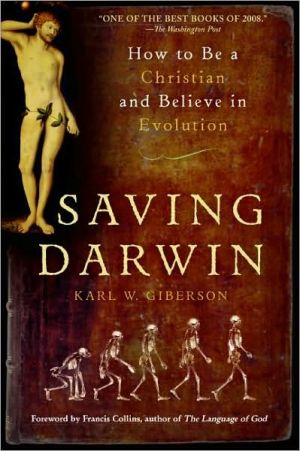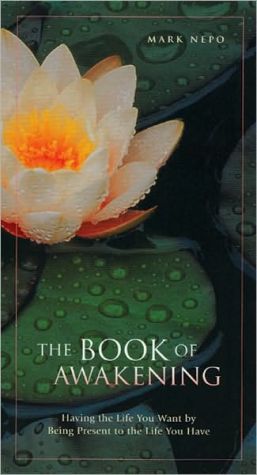Saving Darwin: How to Be a Christian and Believe in Evolution
Evolution Is Not the Bible's Enemy\ \ Saving Darwin explores the history of the controversy that swirls around evolution science, from Darwin to current challenges, and shows why—and how—it is possible to believe in God and evolution at the same time.
Search in google:
Evolution Is Not the Bible's Enemy Saving Darwin explores the history of the controversy that swirls around evolution science, from Darwin to current challenges, and shows why—and how—it is possible to believe in God and evolution at the same time. The Washington Post - Amy E. Schwartz Giberson, a physics professor at Eastern Nazarene College, a historically Christian school, attacks the conundrum with eloquence and clarity. Saving Darwin offers readers two gifts: a cultural history of the anti-Darwin movement that details how its tenets, far from being the traditional doctrine of any church, were developed by a few cranks and fueled by larger, populist fears of secular culture; and an empathetic, comprehensible account of how the world looks if you believe in scientific creationism, as he once did.
Saving Darwin \ Chapter One\ The Lie Among Us\ History records three Charles Darwins. The most interesting Darwin is the one who repudiated his theory of evolution on his deathbed. A colorful character named Lady Hope claimed to have visited Darwin on his deathbed, where she found him reading his Bible and recanting his life's work. "I was a young man with unformed ideas," she quotes him as saying. "I threw out queries, suggestions, wondering all the time over everything. And to my astonishment the ideas took like wildfire. People made a religion of them."1 Lady Hope's winsome story, which historians have shown was a complete fabrication,2 has been circulating broadly among American evangelicals for the better part of a century and can still be found there.3\ History's second Darwin is a sinister character in a story even more popular among evangelicals than Lady Hope's fiction. This Darwin was an enthusiastic and committed unbeliever who combed the globe gathering evidence to rationalize his disbelief. Authors and television personalities John Ankerberg and John Weldon present this Darwin in their popular Darwin's Leap of Faith. They argue that Darwin himself never even found evolution convincing. Their demonized Darwin rationalized atheism by concocting a preposterous theory whose only saving grace was its demolition of the idea that God created the world. To "soothe his fears," Ankerberg and Weldon write, "Darwin adopted a philosophy convenient to his own rejection of God."4 This Darwin is also a fabrication, although lessentertaining than the Lady Hope myth. Reading any one of the many recent excellent biographies of Darwin will put this to rest.\ The third and actual Darwin was neither a deathbed convert nor lifelong crusader against belief in God. He was, in fact, a sincere religious believer who began his career with a strong faith in the Bible and plans to become an Anglican clergyman. He did eventually lose his childhood faith, but it was reluctantly and not until middle age, long after his famous voyage on the Beagle. Toward the end of his life he wrote to an old friend about the painful experience of losing his faith: "I was very unwilling to give up my belief." He recalled daydreaming about something that could arrest his slide into disbelief, perhaps the discovery of "old letters between distinguished Romans, and manuscripts being discovered at Pompeii or elsewhere, which confirmed in the most striking manner all that was written in the Gospels." Gradually, though, he found it harder to imagine being rescued in this way, and "disbelief crept over me at a very slow rate, but was at last complete."5\ The Demonized Darwin\ Unfortunately, the real Darwin is the only one of no interest to anti-evolutionary demagogues. Eager to keep the faithful on track, they smear Darwin and his theory unmercifully. In The Long War Against God: The History and Impact of the Creation/Evolution Controversy, the late Henry Morris proposed that Darwin actually got his theory indirectly from Satan. Darwin, argues Morris with a perfectly straight face, was simply one in a long line of dupes spreading a sinister gospel of materialism originally delivered to humanity by Satan at the Tower of Babel.\ \ The very first evolutionist was not Charles Darwin or Lucretius or Thales or Nimrod, but Satan himself. He has not only deceived the whole world with the monstrous lie of evolution but has deceived himself most of all. He still thinks he can defeat God because, like modern "scientific" evolutionists, he refuses to believe that God is really God.6\ \ Ken Ham, who heads the popular Answers in Genesis organization and is currently America's leading creationist, sees an apocalyptic dimension to evolution. On the back cover of his book The Lie: Evolution, Ham writes: "The Bible prophetically warns that in the last days false teachers will introduce lies among the people. Their purpose is to bring God's Truth into disrepute and to exploit Believers by telling them made-up and imagined stories. Such a Lie is among us. That Lie is Evolution."7\ And finally, in more careful, restrained, and intentionally secular-sounding prose Phillip Johnson, the leader of the intelligent design movement, says: "The aim of historical scientists—those who attempt to trace cosmic history from the big bang or before to the present—is to provide a complete naturalistic picture of reality. This enterprise is defined by its determination to push God out of reality."8 In Johnson's opinion natural science is far too natural.\ To the amazement of most Europeans, who made their peace with evolution long ago, these views on Darwin and his theory are widespread in the United States. The majority of children raised in America's evangelical culture encounter them somewhere, often from creationist evangelists like Ham who head organizations dedicated to destroying evolution. Ham's Answers in Genesis organization, for example, has almost two hundred employees and sponsors thousands of events every year, from visits to churches to massive rallies in public arenas with music and multimedia presentations. Sixty thousand people visit his Web site every day, and his books, videos, and tracts sell well. A $27 million creation museum opened in 2007. A glossy magazine, Answers, goes out to almost fifty thousand readers.9 And, although Ham's operation is the most polished and best funded, there are dozens of others like it. Spreading the gospel of anti-evolution, with Darwin as the villain, is a million-dollar industry reaching an eager audience of American evangelicals larger than the population of any country in Europe.\ But Charles Darwin is not a villain, and these portraits of him are irresponsible and malicious caricatures distorting him beyond recognition. In their eagerness to turn Darwin into a scary boogeyman, his detractors rewrite history and invent motives to suggest that evolution began as a conspiracy to destroy belief in God.\ Saving Darwin. Copyright © by Karl Giberson. Reprinted by permission of HarperCollins Publishers, Inc. All rights reserved. Available now wherever books are sold.
Foreword vIntroduction: The Dissolution of a Fundamentalist 1The Lie Among Us 19A Tale of Two Books 43Darwin's Dark Companions 63The Never Ending Closing Argument 85The Emperor's New Science 121Creationism Evolves into Intelligent Design 145How to be Stupid, Wicked, and Insane 165Evolution and Physics Envy 185Conclusion: Pilgrim's Progress 207Acknowledgments 222Notes 224Index 240
\ The Washington Post Book World"One of the best books of 2008"\ \ \ \ \ John Polkinghorne"Karl Giberson skillfully unravels the tangled skein of argument about creation and evolution, showing that there need be no incompatibility between Christianity and Darwinism. His writing is lively, in a style that is both informal and informed. This is a book that many will find helpful."\ \ \ Ronald L. Numbers"Karl Giberson skillfully unravels the tangled skein of argument about creation and evolution, showing that there need be no incompatibility between Christianity and Darwinism. His writing is lively, in a style that is both informal and informed. This is a book that many will find helpful."\ \ \ \ \ Francis S. Collins"A much-needed book . . . a powerful contribution."\ \ \ \ \ Edward J. Larson"An intensely personal account of [Giberson’s] intellectual journey from creationism to the acceptance of evolution . . . By situating his own story in the context of larger social and scientific developments, Giberson’s book can serve as a guide for other Christians on a similar trek."\ \ \ \ \ Kenneth R. Miller"A poignant account of [Giberson’s] Christian pilgrimage from Creationist to Evolutionist. He offers a sympathetic historical analysis laced with trenchant criticism of both misguided intelligent design advocates and hard core atheists."\ \ \ \ \ John Wilson"Giberson makes the case, persuasively and with considerable wit, that there’s no irreconcilable conflict between robust Christian faith and evolutionary biology, rightly understood. This is a wonderfully readable book: humane, modest, and wise."\ \ \ \ \ Owen Gingerich"Karl Giberson here presents a poignant account of his Christian pilgrimage from Creationist to Evolutionist. He offers a sympathetic historical analysis laced with trenchant criticism of both misguided intelligent design advocates and hard core atheists."\ \ \ \ \ New Republic“Giberson . . . provides an edifying summary of the tenets and the flaws of modern creationism . . . and raises a valuable alarm about the dangers facing American science and culture.”\ \ \ \ \ New Republic"Giberson . . . provides an edifying summary of the tenets and the flaws of modern creationism . . . and raises a valuable alarm about the dangers facing American science and culture."\ \ \ \ \ Washington PostGiberson attacks the conundrum [of evolution] with eloquence and clarity.\ \ \ \ \ Salon.comGiberson posesses a boundless inquisitiveness typical of many scientiests, but also displays the wry wit of a seasoned polemicist. He seems to know how to counteract your best arguments before you have even made them.\ \ \ \ \ Amy E. SchwartzGiberson, a physics professor at Eastern Nazarene College, a historically Christian school, attacks the conundrum with eloquence and clarity. Saving Darwin offers readers two gifts: a cultural history of the anti-Darwin movement that details how its tenets, far from being the traditional doctrine of any church, were developed by a few cranks and fueled by larger, populist fears of secular culture; and an empathetic, comprehensible account of how the world looks if you believe in scientific creationism, as he once did.\ —The Washington Post\ \ \ \ \ Publishers WeeklyDrawing on his fundamentalist upbringing and experience teaching physics at an evangelical college, Giberson has a native understanding of how conservative Christians feel and think about evolution. As a Christian evolutionist, he finds himself occupying a frequently misunderstood middle ground in the midst of "a culture war, fought with culture-war weapons by culture warriors." Behind the culture war, Giberson sketches an engaging historical narrative including Darwin's background in intelligent design, what really happened at the Scopes "monkey trial" and how catastrophist geology derived from Seventh Day Adventism found an audience among the evangelical mainstream in the post-Sputnik era. By tackling the debate in cultural as well as scientific terms, Giberson does greater justice to the motivations of Christians who reject evolution. Yet he does not conceal his frustration-on theological as well as scientific grounds-with the "rubbish" of scientific creationism, which "has climbed onto the radar screens of American intellectual culture only as a bad joke." Giberson's sarcasm, however honestly come by, may cause the book to alienate an evangelical audience it might otherwise engage. (June)\ Copyright © Reed Business Information, a division of Reed Elsevier Inc. All rights reserved.\ \ \ \ \ School Library JournalThis sensitively written and convincingly argued book succeeds in respecting both religious beliefs and scientific facts in discussing theories surrounding the creation of the world. Giberson (physics, Eastern Nazarene Coll., MA) is an outstanding scientist and scholar who tries to unite the uncompromising correctness of creationism and intelligent design with proven scientific knowledge, thereby saving Darwin's evolution theory and re-examining its basic tenets from a Christian worldview. Giberson is passionate in his research, and he makes every effort to narrow the chasm that exists between fundamentalism and science. In this truly courageous work meant to liberate narrow worldviews with the light emanating from profound Christian faith and indisputable reason, he does not posit theology over science or fact over belief but instead celebrates the values intrinsic to both. Reason, philosophy, science, history, and faith all provide the balance for a correct understanding of creation and evolution in this text, complete with references. Recommended for larger public libraries.\ —John-Leonard Berg\ Copyright © Reed Business Information, a division of Reed Elsevier Inc. All rights reserved.\ \ \








